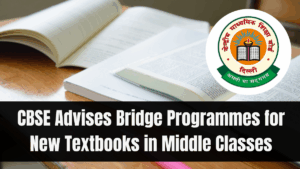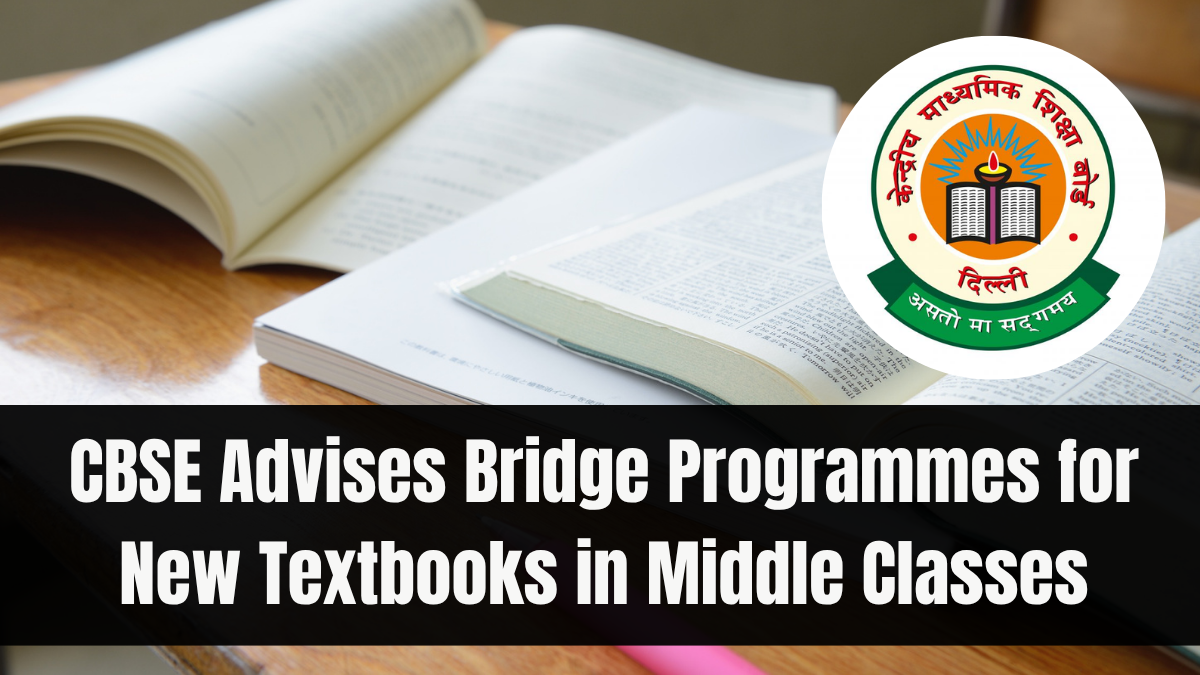In a crucial move to ease academic transition, the CBSE has introduced bridge programmes for students in Classes 4, 5, 7, and 8, following the rollout of revised NCERT textbooks under the National Curriculum Framework 2023. The NCERT Bridge Program for Middle Classes is designed to help students catch up with curriculum shifts and avoid learning gaps caused by the change in content, structure, and pedagogical approach. This step reinforces CBSE’s commitment to student-friendly, gradual academic reform aligned with NEP 2020.

What Is the Bridge Programme All About?
The bridge programme is a short-term, structured academic support system that helps students:
-
Transition smoothly to the new NCERT textbooks introduced in 2025
-
Strengthen foundational knowledge and skills from previous grades
-
Fill any conceptual gaps due to textbook revisions
-
Develop readiness for grade-level expectations with updated content
CBSE has issued guidelines recommending all affiliated schools implement these programmes at the beginning of the academic session, especially for students in middle grades.
Target Classes and Curriculum Changes
The NCERT Bridge Program for Middle Classes specifically applies to:
-
Class 4 and 5 – New Language and Environmental Studies books
-
Class 7 and 8 – New Science, Social Science, and Mathematics books
These classes are seeing content reorganization, updated teaching methods, and new learning outcomes, prompting the need for a structured preparatory phase.
The revised books include:
-
Competency-based chapters
-
Higher-order thinking activities
-
Real-life case studies
-
Cross-disciplinary projects
The bridge curriculum introduces these concepts gradually, ensuring that students are not overwhelmed by sudden academic shifts.
Structure and Duration of the Programme
The CBSE-recommended bridge program typically runs for 4–6 weeks at the start of the academic year and includes:
-
Diagnostic assessments to identify individual learning gaps
-
Modular lessons that revise key concepts from previous grades
-
Introductory sessions on new topics in the upcoming syllabus
-
Activity-based worksheets and peer discussions
-
Weekly review tests and feedback sessions
Schools have the flexibility to customize the format, but CBSE encourages classroom integration, rather than treating it as a separate remedial class.
Teacher Resources and Implementation Tools
To facilitate smooth adoption, CBSE and NCERT have issued the following:
-
Bridge programme handbooks with day-wise lesson plans
-
Sample question banks and activity guides
-
Guidelines for conducting baseline and endline assessments
-
Checklists to track individual student progress
Additionally, webinars and online training modules are being offered to help teachers understand and implement the revised syllabus and bridge content effectively.
Benefits for Students, Teachers, and Schools
The NCERT Bridge Program for Middle Classes offers several advantages:
-
Minimizes stress and confusion for students adjusting to new textbooks
-
Gives teachers time to gauge class readiness and adjust teaching plans
-
Improves classroom participation and confidence, especially in core subjects
-
Encourages multi-grade alignment, ensuring no student is left behind
-
Allows schools to manage the shift to the new curriculum without disruption
Bridge programs also promote collaborative learning and help students develop habits like self-assessment, journaling, and reflective thinking.
FAQs
What is the NCERT Bridge Program for Middle Classes?
It is a preparatory academic module introduced by CBSE to help students in Classes 4, 5, 7, and 8 transition to the new NCERT textbooks smoothly.
Which classes are targeted under this bridge program?
Classes 4, 5, 7, and 8 have been prioritized for the 2025–26 academic year due to the rollout of revised textbooks in key subjects.
How long does the bridge program last?
Typically, the program is designed for 4–6 weeks and should be implemented at the beginning of the academic year.
Are schools required to follow a fixed format?
No. CBSE provides guidelines, but schools have the flexibility to adapt the bridge program to suit their own timetables and student needs.
What kind of support is provided to teachers?
CBSE has released teaching guides, assessment tools, sample lesson plans, and also conducts training sessions for effective implementation.
Click here to know more.




